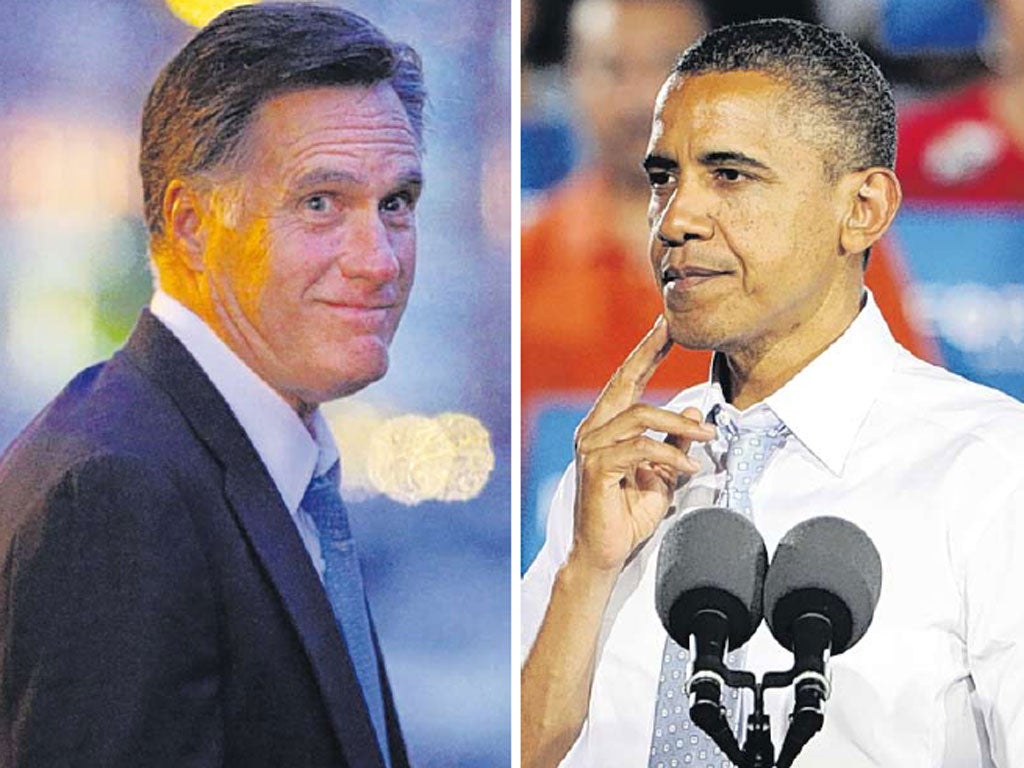The greatest political showdown on earth
It's make-or-break time in the world's most important, and expensive, election. On the eve of tomorrow's televised debate between the presidential candidates (the first of three), Rupert Cornwell looks forward to a momentous month

The largest, the longest, the costliest and the cruellest exercise in democracy on the planet is approaching its climax. Thirty-six days from today (barring a repeat of the Florida dead heat a dozen years ago) a new American president will have been elected – in the event of a victory by Mitt Romney, the 45th in a line stretching back to 1789 and George Washington.
The winner will be the last man standing after a contest that formally began with Iowa's caucuses last January, and continued through a four-month primary season and the late summer party nominating conventions. Now come four presidential and vice-presidential debates, capped by a final draining sprint to the finishing line on 6 November. In reality, though, the process has been under way almost from the instant Barack Obama was sworn into office on the freezing Washington morning of 20 January 2009, promising a new beginning for his country in the midst of its worst economic and financial crisis since the Great Depression.
The final match-up is the one that all along has seemed likely, between the Democratic incumbent seeking his second permitted term, and a Republican challenger who if truth be told never stopped campaigning for the White House even after he had lost his party's 2008 nomination to John McCain. By the time it's all over, some $3bn may have been spent on the presidential election alone, in money raised by the candidates, their respective parties and outside groups (not least the infamous Super PACs, empowered by a Supreme Court ruling that enables super rich donors to contribute as much as they like).
Throw in the similar sum likely to be spent on the down-the-card contests, for all 435 seats in the House of Representatives and 33 Senate seats (one third of the total), as well as a dozen governors' races, and the total outlay for Election 2012 may reach an unprecedented $6bn, equivalent to roughly $50 for every likely voter.
Right now, despite economic indicators that in previous elections would have consigned him to defeat, Mr Obama remains the favourite. Recent history suggests that incumbents who seek a second term usually succeed, and at the time of writing, Intrade, the usually reliable political prediction market, gives him a 75 per cent chance of victory.
Since Herbert Hoover lost to Franklin Roosevelt in 1932, only two incumbents have been defeated: Jimmy Carter in 1980, when the opponent was Ronald Reagan, who arguably caught America's zeitgeist more perfectly than any candidate before or since; and George H W Bush, whose misfortune in 1992 was to find himself up against the most gifted politician of his age in Bill Clinton, at a moment when Republicans had already held the presidency for 12 years. The same rule of thumb operates in the US as in most other genuine democracies. When one party has been in power for a decade the electoral mantra is: throw the bums out.
But even if Romney is manifestly neither a Reagan nor a Clinton, a second Obama term is far from set in stone. The mood of the country is sour; 35 per cent of Americans say the country is on the wrong track, a distinct improvement from a year ago, to be sure, but hardly a resounding endorsement of the status quo. The worst of the Great Recession may be over, but the recovery struggles to gather steam. Since FDR, moreover, no president has been re-elected when the US unemployment rate was above 8 per cent. At the end of August, it stood at 8.1 per cent.
Subscribe to Independent Premium to bookmark this article
Want to bookmark your favourite articles and stories to read or reference later? Start your Independent Premium subscription today.

Join our commenting forum
Join thought-provoking conversations, follow other Independent readers and see their replies